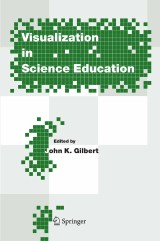Details

Visualization in Science Education
Models and Modeling in Science Education, Band 1
|
96,29 € |
|
| Verlag: | Springer |
| Format: | |
| Veröffentl.: | 30.03.2006 |
| ISBN/EAN: | 9781402036132 |
| Sprache: | englisch |
| Anzahl Seiten: | 346 |
Dieses eBook enthält ein Wasserzeichen.
Beschreibungen
<P>“Visualization in Science Education” draws on the insights from cognitive psychology, science, and education, by experts from Australia, Israel, Slovenia, UK, and USA. It unites these with the practice of science education, particularly the ever-increasing use of computer-managed modelling packages, especially in chemistry. The first section explores the significance and intellectual standing of visualization. The second section shows how the skills of visualization have been developed practically in science education. This is followed by accounts of how the educational value of visualization has been integrated into university courses in physics, genomics, and geology. The fourth section documents experimental work on the classroom assessment of visualization. An endpiece summarises some of the research and development needed if the contribution of this set of universal skills is to be fully exploited at all levels and in all science subjects.</P>
The Significance of Visualization in Science Education.- Visualization: A Metacognitive Skill in Science and Science Education.- Prolegomenon to Scientific Visualizations.- Mental Models: Theoretical Issues for Visualizations in Science Education.- A Model of Molecular Visualization.- Leveraging Technology and Cognitive Tehory on Visualization to Promote Students’ Science.- Developing the Skills of Visualization.- Teaching and Learning with Three-dimensional Representations.- Students Becoming Chemists: Developing Representationl Competence.- Imagery in Physics Learning - from Physicists’ Practice to Naive Students’ Understanding.- Imagery in Science Learning in Students and Experts.- Integrating Visualization Into Curricula in the Sciences.- Learning Electromagnetism with Visualizations and Active Learning.- Visualizing the Science of Genomics.- Visualization in Undergraduate Geology Courses.- Assessing the Development of Visualization Skills.- Evaluating the Educational Value of Molecular Structure Representations.- Assessing Learning from the Use of Multimedia Chemical Visualiztion Software.- Endpiece: Research and Development on Visualization in Science Education.
<P>Visualization, meaning both the perception of an object that is seen or touched and the mental imagery that is the product of that perception, is believed to be a major strategy in all thought. It is particularly important in science, which seeks causal explanations for phenomena in the world-as-experienced. Visualization must therefore play a major role in science education. This book addresses key issues concerning visualization in the teaching and learning of science at any level in educational systems.</P>
<P></P>
<P>‘Visualization in Science Education’ draws on the insights from cognitive psychology, science, and education, by experts from Australia, Israel, Slovenia, UK, and USA. It unites these with the practice of science education, particularly the ever-increasing use of computer-managed modelling packages, especially in chemistry. The first section explores the significance and intellectual standing of visualization. The second section shows how the skills of visualization have been developed practically in science education. This is followed by accounts of how the educational value of visualization has been integrated into university courses in physics, genomics, and geology. The fourth section documents experimental work on the classroom assessment of visualization. An endpiece summarises some of the research and development needed if the contribution of this set of universal skills is to be fully exploited at all levels and in all science subjects.</P>
<P></P>
<P></P>
<P>‘Visualization in Science Education’ draws on the insights from cognitive psychology, science, and education, by experts from Australia, Israel, Slovenia, UK, and USA. It unites these with the practice of science education, particularly the ever-increasing use of computer-managed modelling packages, especially in chemistry. The first section explores the significance and intellectual standing of visualization. The second section shows how the skills of visualization have been developed practically in science education. This is followed by accounts of how the educational value of visualization has been integrated into university courses in physics, genomics, and geology. The fourth section documents experimental work on the classroom assessment of visualization. An endpiece summarises some of the research and development needed if the contribution of this set of universal skills is to be fully exploited at all levels and in all science subjects.</P>
<P></P>
Broad intellectual basis: science, science education, psychology, philosophy Theory and practice closely integrated Authors who are active at the frontiers of the field Authors from 5 countries First book specifically on visualization in science education
<P>This book examines key issues concerning visualization in science education. It draws on the insights from cognitive psychology, science, and education, by experts from Australia, Israel, Slovenia, UK, and USA. Coverage unites these with the practice of science education, particularly the ever-increasing use of computer-managed modeling packages, especially in chemistry. The book first explores the significance and intellectual standing of visualization and shows how the skills of visualization have been developed practically in science education. This is followed by accounts of how the educational value of visualization has been integrated into university courses in physics, genomics, and geology. Coverage then documents experimental work on the classroom assessment of visualization. In addition, the book also summarizes some of the research and development needed if the contribution of this set of universal skills is to be fully exploited at all levels and in all science subjects.</P>
Diese Produkte könnten Sie auch interessieren:

University Science and Mathematics Education in Transition

von: Ole Skovsmose, Paola Valero, Ole Ravn Christensen

96,29 €















